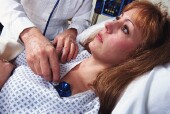- Could Your Grocery Store Meat Be Causing Recurring UTIs?
- Are You Making This Expensive Thermostat Error This Winter?
- Recognizing the Signs of Hypothyroidism
- 10 Strategies to Overcome Insomnia
- Could Artificial Sweeteners Be Aging the Brain Faster?
- Techniques for Soothing Your Nervous System
- Does the Water in Your House Smell Funny? Here’s Why
- Can a Daily Dose of Apple Cider Vinegar Actually Aid Weight Loss?
- 6 Health Beverages That Can Actually Spike Your Blood Sugar
- Treatment Options for Social Anxiety Disorder
Timing of First Period Tied to Women’s Later Heart Risk: Study


The timing of a woman’s first period may be linked to her later risk of heart disease, British researchers report.
In a study of more than 1 million women, those who had their first period at age 10 or younger, or at age 17 or older, appeared to have a higher risk of heart disease, stroke and complications from high blood pressure.
Women who had their first periods at age 10 or earlier were 27 percent more likely to be hospitalized or die from heart disease, the researchers found. Those who had their first menstrual cycle at or after age 17 were 23 percent more likely to be hospitalized or die from heart disease. The researchers found similar — though slightly weaker — associations for the risk of stroke and high blood pressure complications and early or late periods.
“We now understand that the timing of the first menstrual cycle could have a long-term influence on women’s vascular health,” said study author Dr. Dexter Canoy, a cardiovascular epidemiologist in the Cancer Epidemiology Unit at the University of Oxford.
While this study found an association between the timing of a woman’s first period and later heart disease risk, it wasn’t designed to prove whether or not menstrual timing could somehow cause later heart disease, stroke or high blood pressure complications.
Canoy noted that only a small percentage of women had very early or late first periods. However, he added that since being overweight or obese is associated with starting periods at a young age and childhood obesity is increasing, more middle-aged women might be at increased risk of developing heart disease or stroke in the future.
His advice for women? “For middle-aged women, it is probably worth focusing on prevention or treatment of modifiable factors that are strongly associated with heart disease, such as smoking, high blood pressure and high blood cholesterol,” he said.
He also suggested that strategies to prevent excess weight gain during childhood might help avoid early periods. And, avoiding earlier periods might then reduce the number of women at risk of developing heart disease or stroke in the long-term, he said.
The report was published Dec. 15 in the journal Circulation.
Dr. Gregg Fonarow, a professor of cardiology at the University of California, Los Angeles, said that past studies have linked earlier first periods to a higher risk of heart disease and stroke later in life. But, he added, the findings have been inconsistent.
“The reason behind this association is not understood, but some studies have suggested that childhood obesity is associated with earlier periods as well as increased risk for heart disease and stroke,” he said.
For the study, Canoy’s team collected data on 1.2 million women. They were between 50 and 64 years old when the study started. Just 4 percent had their first period at age 10 or earlier. One percent reported having their first period at age 17 or later, according to the study.
The average follow-up time was almost 12 years. During that time, the researchers found that women who had their first period at 13 had the lowest risk of developing heart disease, stroke and high blood pressure.
The effect of age at menstruation on heart disease was consistent among normal weight, overweight and obese women. It was also consistent among smokers and nonsmokers, and regardless of socioeconomic status.
More information
For more on women and heart disease, visit the U.S. National Heart, Lung, and Blood Institute.
Source: HealthDay
Copyright © 2026 HealthDay. All rights reserved.










